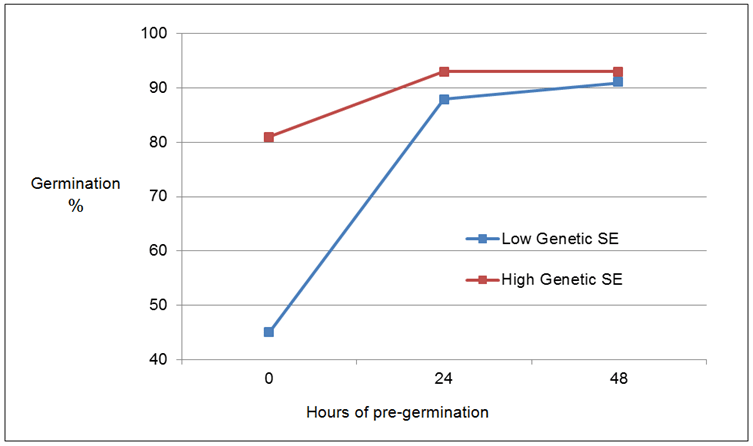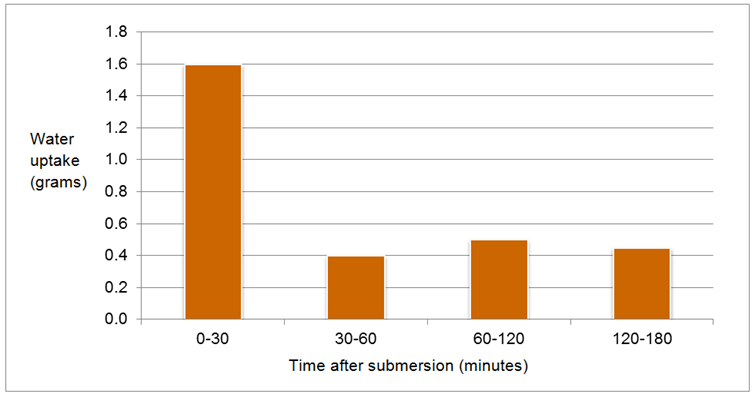Establishing your corn crop successfully
BackSeed genetics
Hybrid genetics provide the basis for tolerance to cold stress. High corn seed quality helps ensure that the seed will perform up to its genetic ability. Pioneer Seeds concentrates on selecting the best genetics for consistent performance across a wide range of environments including stressful conditions.
A wide range of stress emergence conditions and soil temperatures have been seen in Pioneer Seeds ‘stress emergence’ (SE) field trials in Australia. To demonstrate how stress emergence scores relate to stand establishment in the field, hybrids are grouped by ‘low SE’ – those with an SE rating of 3 or 4, and ‘high SE’ – those with an SE rating of 6 or 7. As stress level increased, both the low SE and high SE hybrids experienced stand loss. However, the hybrids with a SE score of 6 or 7 were able to maintain higher stands as compared to those with a low SE score.
Seed quality
Pioneer Seeds corn seed quality program starts in the production field and is present through every process at the Narromine plant. In fact our world class seed production procedures ensure that Pioneer Seeds has the highest quality corn seed with minimum germination rates of 90%. Please bear in mind that seed is a living product and must be treated as such.
Environmental factors
However, even with the best genetics and highest seed quality, environmental factors can still dictate stand establishment.
Corn is a warm-season crop and corn seedlings do best under warm conditions. To help understand optimal corn growth, three hybrids of early, mid and late maturities were germinated in temperatures ranging from 15 to 35 °C. Growth rates of both roots and shoots were measured. All three hybrids were averaged to determine the optimal temperature for corn growth. Both shoots and roots exhibited the fastest growth rate at 30 °C and continued to grow rapidly at 35 °C, suggesting optimal seedling germination and emergence occurs at much higher soil temperatures.

Figure 1: Average early root and shoot growth rates for three hybrids under four soil temperatures ranging from 15 to 35 °C.
When planting corn seeds, soil temperature remains a critical management factor to help growers minimise the risks associated with suboptimal conditions for successful germination. The timing of stress on seed is also an important factor. For instance, data suggests that planting corn seed before a cold front with rain can cause significant stand loss.
To help understand the importance of the timing of cold stress, two hybrids with SE scores of 4 (below average) and 7 (above average) were allowed to germinate in rolled towels for 0, 24, or 48 hours at 25 °C. The hybrids were then subjected to a stress test of melting ice for three days and allowed to recover for 4 days at 25 °C. Hybrids were evaluated for the number of normal seedlings reported as a percentage of germination.

Figure 2: Germination of two hybrids with below-average genetic potential SE and above-average genetic potential SE following imbibitional chilling induced by melting ice. Ice was applied immediately after planting (0 hours) or after 24 hours or 48 hours of pre-germination in warm conditions.
Both hybrids showed significant stand loss when the cold stress was imposed immediately (0 hours). However, the hybrid with a higher SE score had a higher percent germination than the hybrid with a low SE score. Germination rates for both hybrids were greatly improved if allowed to uptake water and germinate at warmer temperatures for at least 24 hours before the ice was added.
Data suggest that planting just before a stress event such as a cold front can cause significant stand loss. The chances of establishing a good stand are greatly improved if hybrids are allowed to germinate for at least one day in warmer, moist conditions before a cold-stress event.
One reason why temperature during imbibition is critical to corn emergence is the fact that seed imbibes most of the water needed for germination very rapidly. To illustrate the rapid timing of water uptake, seed was submerged in 10 °C water for three hours and weighed at intervals of 30, 60, 120 and 180 minutes to determine water uptake.

Figure 3: Amount of water taken up by corn seed during the first three hours after submersion in water with a temperature of 10 °C.
The data show that seed imbibes the most water within the first 30 minutes after exposure to saturated conditions. If this early imbibition occurs at cold temperatures, it could kill the seed or result in abnormal seedlings. Growers should not only consider soil temperature at planting, but also the expected temperature when seed begins rapidly soaking up water. Seed planted in warmer, dry soils can still be injured if the dry period is followed by a cold, wet event.
Stubble residue can adversely affect plant establishment because high amounts of residue tends to hold excess water which significantly lowers soil temperature.
Temperature fluctuations can between daytime and night can also negatively impact on stand establishment. Soil temperature can vary diurnally by 6 °C in some soils.
TIPS FOR SUCCESSFUL CORN ESTABLISHMENT
- Aim to plant into soil that is 12°C between 8 am and 9 am and rising over three days at seeding depth.
- Avoid very early planting dates as this will not greatly improve harvest date but significantly increases risk of an establishment failure.
- Monitor soil temperatures before and after irrigating.
- Monitor water temperature when watering up on beds.
- Pre-irrigate and plant into moisture when growing corn on the flat.
- Minimise the time it takes to irrigate fields.
- In very dry fields a pre-irrigation may be the best option.
Pioneer Seeds is the leading developer and supplier of hybrid corn seeds in Australia. If you have any questions about planting corn seed, contact your local Pioneer Seeds Territory Sales Manager or Farm Services Consultant.
Your seed is backed by
local experience
With dedicated and highly skilled team members located throughout Australia you can be sure of accessing the best local knowledge to help you maximise your investment in Pioneer® brand hybrid seed. Get in touch with your local Territory Sales Manager or Farm Services Consultant today.

